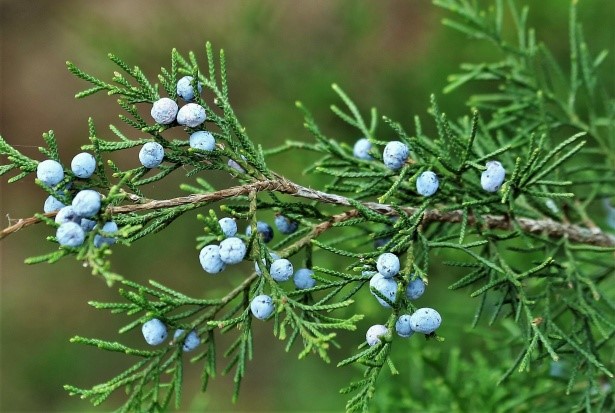GREEN AND GROWING
Landscaping with Junipers

Junipers (Juniperus, spp.) are among the most versatile and hardiest landscape plants. This genus is represented by more than 50 species and hundreds of cultivated varieties, many of them native to the U.S. East coast. The tallish evergreen tree which is quite common in fields and young forests in North Carolina is a juniper, even though it is called a Red Cedar. As well, the bluish-gray, spreading groundcover with prickly needles is also a (different) juniper species. Junipers can be used for screens, hedges, windbreaks, formal plantings, foundations, and ground covers.
Junipers are well adapted to dry sites and full sun. In those environments, it is usually a low maintenance, durable plant. In shade, plants tend to become leggy and prone to diseases and mites. Spider mites can severely injure juniper foliage by removing cell contents with their sucking mouthparts. Control of this pest can be difficult due to the unpredictable nature of the sudden outbreaks. Scale insects infest twigs and branches of juniper which weaken the host. In North Carolina, bagworms can defoliate junipers.
Principal diseases of juniper are twig blights caused by fungi. These diseases are most prevalent in shaded locations and where sprinkler irrigation is used. On wet, poorly drained soils, Phytophthora root rot can cause decline and death of plants. Therefore, observe the second rule of juniper care: water sparingly, if at all. Where juniper is planted near crabapple, hawthorn, or certain other related species, orange galls are often produced on branches. Caused by a rust disease, these spectacular galls produce many inquiries from homeowners but cause little damage to the plant.
In ground cover plantings, voles often feed on bark tissue in winter resulting in girdling and death of stems. (I personally find that when juniper is used as a groundcover, it can be very effective, but when weeds do spring up, it can be very difficult to get in among the prickly branches and remove the weeds.) While juniper is not a favored host for deer, damage does occur when animal populations are high and alternative food sources are limited.
These vulnerabilities mean that landscape junipers should be regularly inspected for damage and corrective measures taken immediately upon discovering problems. In the winter, inspect for deer and vole damage. In the rest of the year, check for spider mites, bag worms and funguses. For further information about junipers, click here.
Tom Watson
Tom Watson is a Volunteer Extension Master Gardener in Mecklenburg County. He has also received a Certificate in Native Plants from UNC-C and a Certificate in Horticulture Technology--Residential Landscape Design from CPCC. He and his wife, Sue Bartlett, own The Cedars Davidson Bed & Breakfast.


